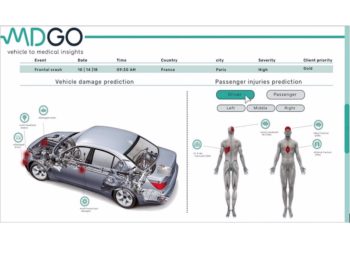Next-gen Hyundais to assess driver injury severity in sub-seven seconds
Hyundai is exploring how artificial intelligence (AI) injury analysis could be used to shape future vehicle safety systems, enabling assessment of required medical response in as little as seven seconds in the event of an accident.

The artificial intelligence technology predicts driver injury severity, enabling early assessment of required medical response
The carmaker has teamed up with MDGo, an Israeli start-up specialising in medical AI systems, to co-develop connected services.
MDGo’s AI technology interprets accident data and compiles numerous sets of insights regarding the occupants and the vehicle. Within seven seconds of impact, emergency services are sent a detailed analysis of potential injuries, communicated through medical terms.
The technology uses an AI algorithm that measures the attributes applied to the passengers in real-time and alert emergency services and medical facilities to a driver’s likely injuries following a road traffic accident.
The technology will ensure prompt responses to accidents and deployment of appropriately skilled medical personnel at the scene.
“MDGo possesses exceptional AI analysis technology optimised for driver safety,” said Youngcho Chi, president and chief innovation officer at Hyundai Motor Group. “Through this technology, we expect a significant improvement in the emergency medical services of vehicles in the short-term while our long-term goal is to provide innovations in passenger experience of vehicle safety utilising new technology that enable real-time physical monitoring.”
The new partnership will also help Hyundai evolve the active and passive safety capabilities of its vehicles. Big data gathered from detailed, intelligent analysis of multiple accident scenarios will inform the carmaker of how to augment crash structures and integrate new technologies to overcome issues identified by the AI analysis.
The partnership has been fostered through the Tel Aviv hub of Hyundai Motor Group’s Cradle venturing and open innovation business, and follows other medical-related announcements by Hyundai, such as the development and future commercialisation of a multi-collision airbag system – said to be a world first. Meanwhile the carmaker last year demonstrated how its Nexo fuel cell vehicle could communicate with physicians while in autonomous mode, sharing a passenger’s medical information in real-time, including blood pressure and heartbeat data.

